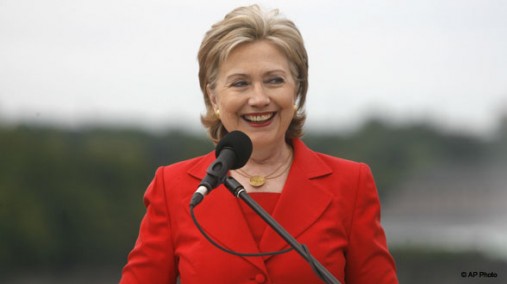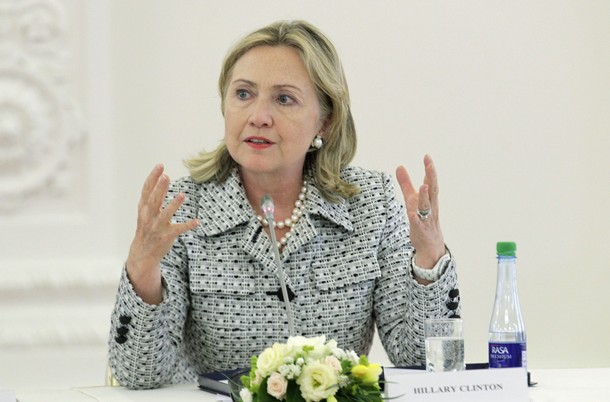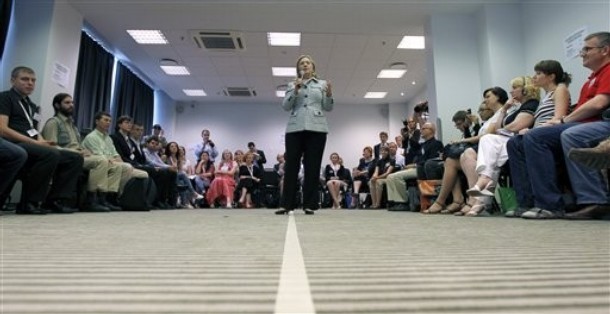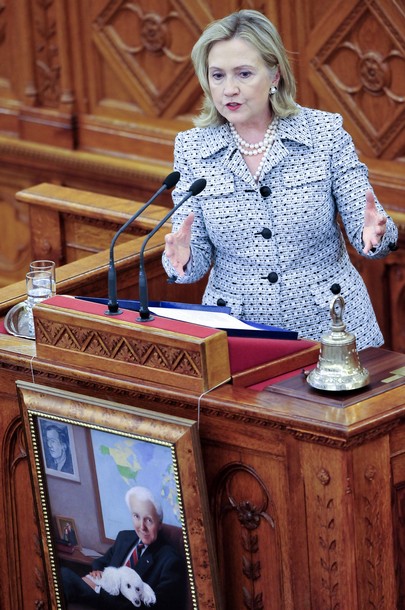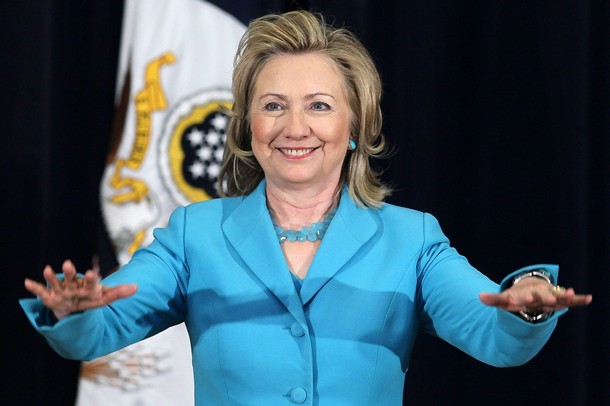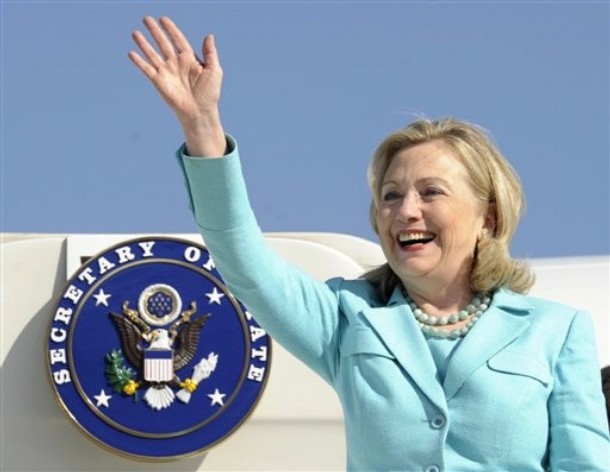SENIOR ADMINISTRATION OFFICIAL THREE: So the Secretary is on her way to Budapest for the opening of the Tom Lantos Institute and her bilateral visit in Hungary. She will then go on to Vilnius, Lithuania for the Community of Democracies event and a bilateral visit there, and then onto Spain for a bilateral visit. To give you the flavor of this trip, we have two senior administration officials, and I will now turn it over to official number one.
SENIOR ADMINISTRATION OFFICIAL ONE: The Secretary is going to be able to visit three countries on this trip that she has not previously visited in her capacity as Secretary of State. And so that makes it a special trip for her and the countries involved. And she will on this trip do what we always do when we travel to Europe, which is advance our broad based and comprehensive partnership with Europe and with Europe abroad.
She’ll be talking across the board about the things that we are doing with and in support for these countries. She will look at internal developments, especially in the countries of Hungary and Lithuania as they mark 20-plus years of transition. She will also be looking at issues of economic adjustment, particularly in the country of Spain. And with all three of the countries she will be looking at the EU agenda as we collaborate with our EU partners, as all three of these countries are EU members. She will be working with them on our global agenda, as Europe is really the cornerstone of our global engagement, and she will be talking about the details of what we are doing to advance stability and democracy in every place from the Balkans to Afghanistan to Libya.
As part of our global engagement, one of the special themes of this entire trip and for each of her stops will be democracy and what we are doing together as democracies to advance the issues of human rights, fundamental freedoms, to perfect our own democracies, and to advance this agenda elsewhere. As you know, one of the issues that she has emphasized and that we are seeing on the ground is how difficult democratic transition can be and how important it is for us to seize moments of opportunity to make sure that we translate promise into reality, and as we do so, to make sure that we carry out a very special responsibility that we as established democracies, but also newer democracies, even like second generation democracies that have come through transition, to pay it forward and to help to use the assistance and the support, the lessons, and the experiences that we’ve gained to help others who are in the midst of their own struggle.
In Hungary, as you have heard already, the Secretary will start with the opening of the Lantos Institute, and there really will be two themes as part of that event. First is the extraordinary individual that Tom Lantos was as the only Holocaust survivor to be a member of Congress, a lifelong fighter for human rights and freedom, but also somebody who in the midst – in the course of his congressional tenure worked across partisan lines. And all of those themes will also carry over in terms of what the Lantos Institute is about, what it is set up to achieve, which is to advance democracy, inclusion, tolerance, bipartisan cooperation.
She will also meet with civil society leaders in Hungary that will allow her to carry on that message and that dialogue from the Lantos Institute, and she will be able to hear from political voices across the spectrum of Hungarian political life and to continue that dialogue. And then, of course, she will have a session with Prime Minister Orban, and in that session she will talk about all aspects of our wide-ranging partnership, the many areas on which we cooperate, everything from Libya, where Hungary is the protecting power for the United States, to Afghanistan, where they have 500 troops on the ground and lead a PRT or provincial reconstruction team, and to the EU agenda, where they are working on energy cooperation, issues relating to Roma, issues relating to Croatia’s accession into the European Union. And of course, as a friend and partner, we will also talk about advancing democracy, strengthening democracy within Hungary.
We will talk in greater detail later about the agendas in Lithuania and Spain, but just to touch very briefly for them now, when we arrive later in the day in Lithuania after the Hungary stop, the Secretary will take part in an event on women enhancing democracy. This will include over 20 women leaders from the Middle East, Europe, elsewhere around the world. It is an event that is co-chaired by the Lithuanian and Finnish presidents, but it will also include leaders from Kosovo, Kyrgyzstan, Mongolia, and Slovakia. It is women’s rights and advancement of women is a key part of our human rights agenda. It’s the work that Ambassador Melanne Verveer has been engaged in. The U.S. and Lithuania are co-chair of the Community of Democracies Working Group on Gender Issues, and this will be an opportunity for the Secretary and all these women leaders to address the issues that are associated there.
The Secretary will then have a Strategic Dialogue with Civil Society that is a continuation of the Strategic Dialogue she launched in Washington. She is committed to hearing directly from the people who are on the ground working to advance democracy. She wants to know about the problems and the challenges they face, but also about where they see progress and potential, and to share ideas about the way forward. There are about 150 civil society leaders who will be present in Lithuania for an event associated with the Community of Democracies, and this will involve individuals from that group.
On Friday morning, the Secretary will attend the Community of Democracies ministerial, which will include representatives from about 130 countries around the world. And (inaudible) --
QUESTION: (Inaudible.)
SENIOR ADMINISTRATION OFFICIAL ONE: About 130.
QUESTION: Do you know some of the prominent participants from other countries?
SENIOR ADMINISTRATION OFFICIAL ONE: We can get you the list. We can get you the list and go over that. And here again, it is about the need to help each other. It is about a need to share lessons learned, talk openly, and see what we can do at this crucial time for action, when we’ve watched the events in Egypt and Tunisia, we’ve watched Arab Spring across the Middle East and Africa, and again, as I said before, to recognize the reality of how difficult transitions can be, the need for those in transition to get help, and the responsibility of those who have been through that transition, long ago or recently, to reach out and help.
The Secretary will also do a number of bilateral meetings in Lithuania. She will meet with the prime minister, the president, and the foreign minister to talk about everything from energy and economy to democracy in the neighborhood and particularly neighboring Belarus. She will touch on issues and the positive developments with the Lithuanian parliament’s recent passage of a Holocaust compensation bill. And she will join the Baltic foreign ministers in an event to commemorate the 20th anniversary of Baltic independence.
And then, just lastly, on Saturday morning in Spain, the Secretary will meet with both the prime minister and the foreign minister. As you know, Spain is a longstanding and greatly valued ally in Afghanistan. They’re working together with us in Libya across the board, and it’s an opportunity for us to look again at the cooperation that we have underway, also, so many contemporary issues, especially as they relate to the economy and what we can do together across the broad range.
SENIOR ADMINISTRATION OFFICIAL THREE: Senior Official Two, anything to add?
SENIOR ADMINISTRATION OFFICIAL TWO: I think it’s useful to see this trip within the context of the one the President just completed, to – it’s useful to look at this trip by the Secretary of State in the context of the trip the President just completed to Europe in May because these themes are continuous across our Administration. As you know, when the President traveled, one of the principal themes of that trip was the importance of our alliance relationships in Europe. During that trip he visited four countries. On this trip, we will visit three very close allies, important allies, both within Europe and in meeting the global challenges that we face. And so one significant element the President (inaudible) is that we strengthen those alliance relationships because they’re so important to us as we work together to catalyze global action.
Second, as [Senior Administration Official One] said – as Senior Official Number One said – this trip is an important trip with respect to the themes of democracy, development, both within Europe and beyond. That was a very significant element of the President’s engagement in Poland on the last trip, the final stop on his trip. And there, we are working to consolidate democracy in Central and Eastern Europe, especially with regard to those countries that haven’t yet made a full and successful transition to democracy. Senior Official Number One mentioned Belarus, which we are very concerned about. There could well be significant protests and further violence today. We’re watching that very closely. And so we will be putting a spotlight on Belarus. We also have concerns about (inaudible) in Ukraine, and we have continued engagement with the Government of Ukraine to express our concerns there.
I’d also say, with regard to democracy in Europe, that there’s an important element of the continuing efforts to achieve an integrated Europe, and there we have encouraged the EU to keep its door open and to continue to welcome those countries that meet its standards for membership. And that’s a very important incentive to countries that have not made their full transition to democracy, to achieve that transition in order to join the EU.
Third, a major theme of the trip is, as Senior Official One mentioned and which, again, reflects an important element of what the President did during his trip to Europe in May, is to speak with our close allies about our global agenda. There we work with our allies – the ones we will be visiting during this trip – on the full range of issues that we face together in the world. These are significant contributors to Afghanistan; they’re involved in the Libya operation, both in the NATO command and control and also in terms of providing support for the implementation of the UN Security Council resolution. We work with them, on the advance of the Arab Spring, more broadly on democracy promotion outside of Europe, and we work with them on climate change, we work with them on a huge range of issues, all of which will be discussed in the bilateral meetings that the Secretary will conduct.
So I think that it’s important (inaudible) to see this as a trip that reflects the continuing of our engagement with Europe from the outset of this Administration and which was highlighted during the President’s (inaudible).
SENIOR ADMINISTRATION OFFICIAL THREE: Thank you. We can take three of your questions.
QUESTION: You said that the United States is particularly concerned – very concerned about events in Belarus, where there could be more violence, and about backsliding in Ukraine. To what extent is the U.S. Government concerned about the treatment of the Roma in Hungary and also what some might describe as backsliding in Hungary with regard to the press law, the constitution, et cetera? And to what extent will the Secretary raise those issues, in public or in private, while she’s in Hungary?
SENIOR ADMINISTRATION OFFICIAL ONE: I’ll speak up. You don’t have to --
QUESTION: Thank you.
SENIOR ADMINISTRATION OFFICIAL ONE: We are concerned. Roma is an issue of particular interest for Secretary Clinton and for this Administration. We’ve worked together with Hungary during the course of their EU presidency on their efforts to develop an EU policy toward the Roma, and that is an issue that we look forward to discussing. As I said at the outset, we are also very interested to see the strengthening of democracy in Hungary. We want very much to support advancements on democracy in Hungary, and that will be a key part of our dialogue, both with civil society and with the Hungarian Government.
SENIOR ADMINISTRATION OFFICIAL THREE: I think you can expect the Secretary to speak to both of these issues tomorrow quite clearly.
QUESTION: Can I ask a question about – you were talking about alliances as a foundation for stability. I’m wondering if the Secretary is going to bring up at all Greece in the context of meetings with other EU members because of the potential instability that could spread from there. And more broadly – she references this in her speech as well, NATO and the EU being a great foundation for stability and so on, but recently we’ve seen Secretary Gates criticize NATO as being almost outmoded or at least in need of a new mission, and Greece does threaten the EU. So I’m just wondering if you have any concerns about that? I mean, it’s – it doesn’t look – (inaudible) as a way to encourage (inaudible).
SENIOR ADMINISTRATION OFFICIAL ONE: Yeah. Both NATO and the EU have, for many decades, been a force for stability and a force for integration. And as my colleague mentioned, those are the trends and trajectories that we want to see continue and that we are working to support, both as it concerns aspiring members to those organizations but also the issues that arise in the context of membership for both of those institutions. The issue of the economic situation in Europe across the board is one that is current and that the Secretary will raise in the course of this trip. As you know, she’s not stopping in Greece, but we have said just about every day over the course of the past 10 days how pleased we are to see the courageous decisions being taken by the government in Greece and their determination to do those things that are necessary in order to bring their economy into the right circumstance.
SENIOR ADMINISTRATION OFFICIAL THREE: On NATO, the Secretary has said very clearly that it is important, even as we work together strongly in Afghanistan and Libya and Kosovo, around the world, not to be complacent, that we have to continue to invest in these institutions. And whether it’s NATO members investing in NATO, whether it’s EU members using the strength of the EU to try to address their economic issues collectively, the institutions add value to the national efforts.
SENIOR ADMINISTRATION OFFICIAL TWO: I would just also make a point, which is that that’s actually not what Gates said in his speech. It wasn’t about NATO needing a mission. What he – as the Defense Secretary, was asking that NATO do is ensure that it has the capabilities required to fulfill its commitments, and that’s a distinct difference.
SENIOR ADMINISTRATION OFFICIAL THREE: Time for one more.
QUESTION: Firstly, you mentioned Belarus, both of you. What do you hope to achieve beyond the expressions of support or condemnation that we’ve heard for the last 20 years? What does the Arab Spring bring to the table that wasn’t there before, and what would you hope to get from Communities of Democracies or the Western democratic liberal community?
SENIOR ADMINISTRATION OFFICIAL TWO: Do you want to start with that, and I’ll –
SENIOR ADMINISTRATION OFFICIAL ONE: Sure. I’m happy to start on Belarus. And as you know, Belarus has been a longstanding problem. Things have recently gotten worse, and it is an issue of great concern for the countries of the region, but for all of the friends of democracy across Europe and Eurasia. There have been a number of statements that have been issued by political leaders about the situation in Belarus, but those statements have also been backed up by actions. Everything by sanctions from the European Union to travel restrictions, other measures, asset freezes, things – steps that have been undertaken by the United States Government as well as by many European governments individually and the EU together.
There have been – also been efforts to set up funds to take concrete action to promote democratic development inside Belarus to liberalize travel for those not associated with the regime so that we can work at the problem, if you will, from both directions.
SENIOR ADMINISTRATION OFFICIAL TWO: One of the things you’ll see tomorrow in Lithuania is some of the work that we’re doing to strengthen civil society through a variety of means. I don’t want to --
SENIOR ADMINISTRATION OFFICIAL THREE: I think we’ll talk a little bit more about that precise vehicle tomorrow when we pre-brief on Lithuania. But –
SENIOR ADMINISTRATION OFFICIAL TWO: Yeah. But there’s some exciting work we’re doing to support civil society in repressive places and to get tools to enable those who are seeking to break out of the oppression that they’re experiencing, and that work we’re doing closely with our European allies. You heard this when we were in Poland with the President, that the Poles have played a leadership role in this regard in working with us on Belarus, but we also have close cooperation with the EU broadly and with a number of these countries bilaterally, including with the Lithuanians.
SENIOR ADMINISTRATION OFFICIAL THREE: Okay, guys.
QUESTION: Can I ask one more? A quick one? On her speech, (inaudible) reference to countries that crow about their economic growth but don’t respect the freedoms, as if they’re mutually exclusive. I’m assuming that’s a reference to China, and I’m wondering if there’s any sort of – if the U.S. is having or seeing any sort of encroachment by China or China’s attempts to (inaudible) people in Central and Eastern Europe, the way you see China sort of pushing its agenda in South America or Africa.
SENIOR ADMINISTRATION OFFICIAL THREE: The Secretary, as you know, throughout her tenure, has stressed the importance of democracy, economic liberalization, development going hand in hand, and that there is a limit to how much you can do on one track if you aren’t also making progress on the other track. So I think you just see that theme repeated here.
Thanks, you guys.
QUESTION: (Inaudible.) She’s not going to go beyond what the U.S. Government has previously said about Greece, correct? The economic stuff gets left to the Treasury as it always does? There’s nothing new or –
SENIOR ADMINISTRATION OFFICIAL THREE: They are in the middle of trying to work through their issues, so we are supportive of the efforts that the government is undertaking and watching closely as they make very important decisions in the next couple of days.
QUESTION: I think the Treasury – its purview for the most part

